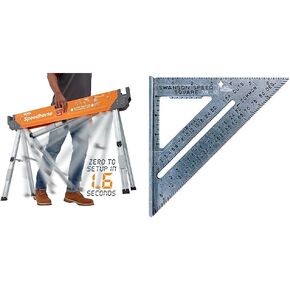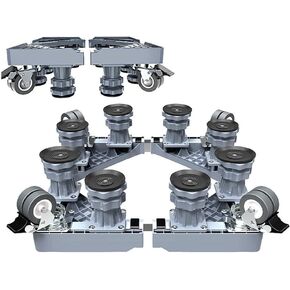- Shopping, made easy.
- /
- Get the app!
Assembly and Adjustability: The tool base is typically easy to assemble, often coming with clear instructions and minimal tools required. It offers adjustable features, such as telescopic rails or brackets, to fit a variety of equipment sizes and shapes. This adaptability makes it compatible with different types of shop machinery. Weight Capacity: The mobile tool base is designed to handle heavy loads. It typically has a weight capacity ranging from 200 to 1000 pounds, depending on the specific model and manufacturer. This ensures that it can adequately support heavy and bulky equipment. Stability and Durability: The tool base is constructed with stability and durability in mind. It utilizes robust materials, such as reinforced steel or heavy-duty plastic, to withstand the weight and pressure of the equipment. This construction also ensures long-lasting performance and resistance to wear and tear in a workshop environment. Portability and Storage: The wheels on the tool base allow for easy transportation of equipment from one location to another within the workshop. Some models may feature swivel casters for increased maneuverability. Additionally, the tool base may have a compact design, allowing for efficient storage when the equipment is not in use. Floor Protection: The mobile tool base often incorporates features to protect the workshop floor. This may include rubber or polyurethane wheels that are non-marking, preventing damage to the floor surface. Some models may also have a built-in leveling system to ensure stability on uneven floors. Compatibility: The mobile tool base is compatible with a wide range of shop equipment, including table saws, drill presses, band saws, jointers, planers, and more. It offers a versatile solution for moving and positioning various types of machinery in the workshop.
 Bora Portamate Speedhorse Sawhorse - 45-in W x 30-in H Single Piece Table Stand with Folding Legs, Metal Top for 2x4, PM-4500 & SWANSON Tool Co S0101 7 Inch Speed Square, Blue
KWD 35.500
Bora Portamate Speedhorse Sawhorse - 45-in W x 30-in H Single Piece Table Stand with Folding Legs, Metal Top for 2x4, PM-4500 & SWANSON Tool Co S0101 7 Inch Speed Square, Blue
KWD 35.500
 ERGOMASTER Saw Horses 2 Pack Folding, Lightweight Saw Horse with 2x4 Detachable Support Arm, 1322 Lbs Weight Capacity of Per Sawhorse, Portable Collapsible Saw Horses Heavy Duty for Woodworking, DIY
KWD 27
ERGOMASTER Saw Horses 2 Pack Folding, Lightweight Saw Horse with 2x4 Detachable Support Arm, 1322 Lbs Weight Capacity of Per Sawhorse, Portable Collapsible Saw Horses Heavy Duty for Woodworking, DIY
KWD 27
 Spd Slot Hlsw 2-1/4dbox
KWD 5.500
Spd Slot Hlsw 2-1/4dbox
KWD 5.500
 Mobile Bases Adjustable for Furniture, Heavy Duty Rolling Cart with 4 Locking Casters, Universal Platform Dolly for Washer and Dryer (Color : Gray, Size : 8 Legs)
KWD 38.500
Mobile Bases Adjustable for Furniture, Heavy Duty Rolling Cart with 4 Locking Casters, Universal Platform Dolly for Washer and Dryer (Color : Gray, Size : 8 Legs)
KWD 38.500